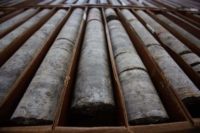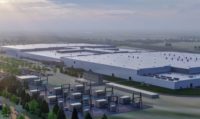A push by U.S. and Australia to build infrastructure to extract and process rare earth elements to support clean energy technologies and counter China’s market dominance are moving quickly.
The U.S. Dept. of Defense has awarded a $120-million contract to a domestic unit of Australia-based Lynas Rare Earths Ltd. to build the first heavy rare earth processing plant in the U.S., while MP Materials is starting construction on a rare earth metal alloy and magnet manufacturing plant—both located in Texas. Fluor Corp. meanwhile has won an EPC contract of undisclosed value to develop Australia’s first rare earths refinery.
DOD’s June 14 contract is for the first industrial scale separation and processing plant for heavy rare earth elements to support energy and commercial products as well as a supply chain for the U.S. defense and industrial base, in a direct investment to boost capacity that market observers say is rare for the U.S. government.
The contract is a “cornerstone” in securing resilient supply chains that allows the U.S. and allies to end dependence on foreign supplies, Halimah Najieb-Locke, a deputy assistant defense secretary, said in a statement. Demand for rare earths such as cobalt, copper, lithium and nickel are on a sharp rise for use in electric vehicle production and solar and wind energy generation.
Feedstock will be mixed rare earths carbonate from the Lynas mine in Western Australia. The company is building a plant there for initial processing before material is sent to the U.S.
Lynas USA LLC plans to locate the plant next to a light rare earths separation plant announced in 2021 and half-funded by DOD, which capped its investment at $30 million.
The Lynas awards are funded by the agency’s Industrial Base Analysis and Sustainment program and awarded under the Defense Production Act. Lynas USA will design, build and commission the plants with the help of its Australian parent.
MP Materials, which owns and operates the rare earth mining and processing site in Mountain Pass, Calif., in April began construction of the first U.S. rare earth metal, alloy and magnet manufacturing plant in Fort Worth. The facility is a “substantial component” of a $700-million investment the company will make during the next two years to restore the U.S. rare earth magnetics supply chain, the company said. DOD in February awarded MP Materials $35 million to refine and separate heavy rare earth elements at Mountain Pass, which will be feedstock for the Fort Worth plant.
General Motors said in December that it had entered into a strategic collaboration with MP Materials to develop a fully integrated supply chain for rare earths magnets for motors used in GM electric vehicles. Production should begin in 2023.
Australia Boosts Capacity
Fluor’s June 22-announced contract with Iluka Resources is for a fully integrated rare earths refinery in Eneabba, Western Australia. A Fluor spokesman declined to share the contract value. Construction is set to begin this year with operations to begin in 2025. Australia has the world’s sixth-largest rare earth reserves.
The government of Western Australia on June 22 launched an effort to become what officials said would become the "choice for investment across the battery and critical minerals value chain.”
The state says it has attracted more than $9 billion of investment for battery and critical mineral projects over the past decade including mineral processing plants. They include BHP Nickel West, Australia’s first nickel sulphate crystals, which began operating in October 2021. When fully operational it will produce enough nickel sulphate annually to make 700,000 electric vehicle batteries, the company said.
Ecograph is in the process of receiving approvals for its battery anode material plant. The Australian government in February gave conditional approval for a $56 million loan to expand its proposed plant.
Hastings Technology Metals expects to begin construction of the Yangibana Rare Earths project in the third quarter of this year after receiving final approvals. Production is expected to begin at the end of 2023. It has a $140-million loan to support construction. Australian Vanadium has a $49-million grant from the government for a proposed vanadium mine and processing plant.
Lynas Rare Earths began construction on the country’s first rare earths processing plant in April that is scheduled to begin operating in July 2023. Pure Battery Technologies in partnership with Poseidon Nickel in March received a $119.6-million government grant or a proposed battery cathode active material refinery hub.
Charlotte, N.C.-based specialty chemical company Albemarle also is building a lithium hydroxide processing plant with two processing trains in Western Australia set to be commissioned this year, the company told ENR. Multiple companies were involved in facility construction, a spokesman said.





Post a comment to this article
Report Abusive Comment